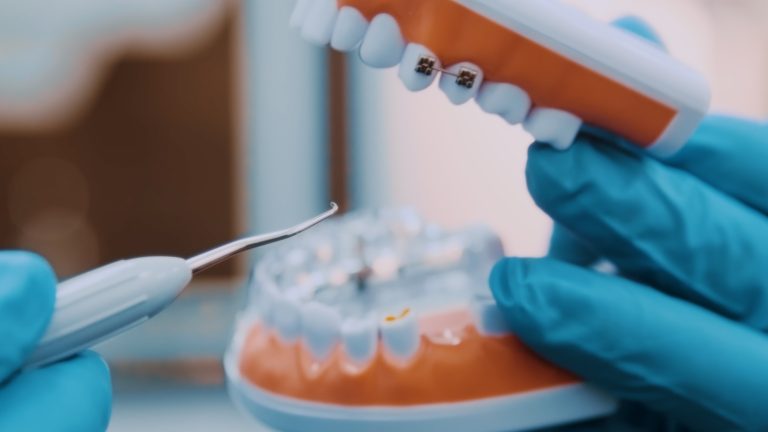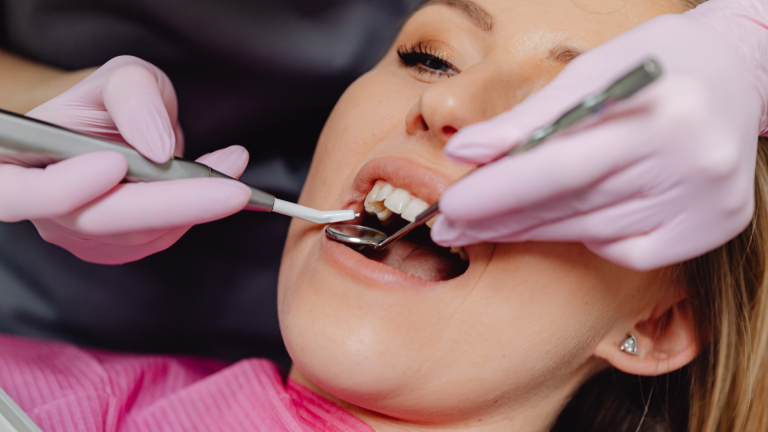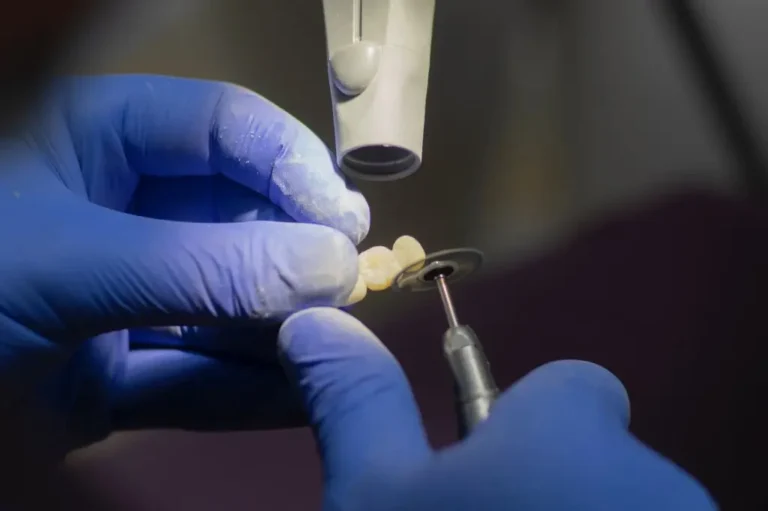Millions of individuals today suffer from diabetes, a chronic ailment that arises when the body cannot manufacture sufficient insulin or utilize it properly, thus forcing glucose to accumulate in the bloodstream. This results in various complications.
One such complication which is often overlooked is the terrible influence on oral health. People with diabetes are more susceptible to gum disease, tooth decay, and other dental issues, which can wreak havoc to their overall oral health.
In this blog post, we will discuss diabetic dental care and offer tips on how to maintain good oral health while battling diabetes.
Understanding the Connection Between Diabetes and Oral Health
Diabetes can lead to a variety of oral health problems, including:

1. Gum disease:
Gum disease, which develops when germs accumulate on the teeth and gums, is a more likely side-effect for people battling diabetes. The soft tissue and bones that support the teeth may become inflamed and damaged as a result of this.
2. Tooth decay:
Salivary glucose levels may rise as a result of diabetes, which may encourage the development of dangerous bacteria in the mouth. Tooth decay and cavities may develop from this. If you already have tooth decay, no worries. Here are some tips for preventing tooth decay.
3. Dry mouth:
Diabetes patients may suffer dry mouth because their bodies produce less saliva. Additionally to increasing the risk of gum disease and tooth decay, this can make it more difficult to chew and swallow food.
4. Thrush:
Thrush, a fungal infection that can affect the lips and tongue, is another condition that can be a high risk, caused by diabetes.
Signs and symptoms of dental problems in diabetic patients
It’s important to be aware of the signs and symptoms of dental problems that can occur in diabetic patients. Some of the most common signs of dental problems in diabetic patients include:
1. Bleeding gums:
Gum disease may be present if you experience bleeding when you clean or floss your teeth. Gum disease is more common in people with diabetes, therefore it’s important to monitor any bleeding or inflammation in the gums.
2. Bad breath:
Poor oral hygiene or a hidden dental issue may be indicated by bad breath. Diabetes patients may be more likely to experience dry mouth, which might worsen their breath.
3. Tooth sensitivity:
If you have sensitive teeth when consuming hot or cold meals and drinks, this may indicate tooth decay or other dental issues. It’s important to pay attention since people with diabetes may be more susceptible to tooth decay.
4. Loose teeth:
If you have any looseness or movement in your teeth, this may indicate gum disease or other dental issues. Diabetes increases the risk of gum disease, which over time can weaken the bones and soft tissues that support the teeth.
5. Mouth pain or swelling:
Mouth pain or swelling might be an indication of an infection or an abscess, two dental conditions that could be hiding beneath the surface. If you have any discomfort or swelling in the mouth, you should schedule an appointment with a dentist as soon as possible.
People with diabetes can take the required actions to treat any dental issues as soon as they materialise by being aware of these indications and symptoms. In order to identify and treat tooth issues early on, before they worsen, regular dental examinations are also crucial. Make sure to contact your dentist as soon as possible if you notice any changes in your dental health.
Tips for Maintaining Good Oral Health with Diabetes
Here are some tips that you can follow in order to maintain your oral health if you have diabetes:
1. Maintain steady blood sugar levels:
Good general health, including dental health, depends on stable blood sugar levels. The risk of gum disease, tooth decay, and other oral health issues might rise with high blood sugar levels. Make sure to routinely check your blood sugar levels and take action to maintain control.
2. Regularly brushing and flossing your teeth
This is important for maintaining good dental health, especially for those who have diabetes. To get rid of food particles and plaque that can cause gum disease and tooth decay, be sure to brush your teeth at least twice a day and floss once a day.
3. Use an antimicrobial mouthwash
This is to help lower the number of dangerous germs in your mouth and guard against tooth decay and gum disease. A fluoride-containing mouthwash should be sought out as it can assist in enhancing tooth enamel strength.
4. Schedule frequent dental checkups:
Having excellent oral health is important for everyone, but it’s especially important for diabetics. Make sure to tell your dentist that you have diabetes and to schedule regular appointments. To assist avoid dental issues, they could advise more frequent cleanings or other procedures.
5. Quit smoking:
Smoking is harmful to overall health and can increase the risk of gum disease, tooth decay, and other dental problems. If you smoke, consider quitting to reduce your risk of oral health problems and improve your overall health.
6. Choose healthy foods:
A healthy diet is essential for good overall health, including dental health. Make sure to choose foods that are low in sugar and high in nutrients, such as fruits, vegetables, whole grains, and lean proteins. Here is a list of foods that are good for your teeth and gum.
7. Stay hydrated:
Drinking plenty of water can help keep the mouth hydrated and prevent dry mouth, which can increase the risk of tooth decay and gum disease.
Conclusion
For everyone’s health, but especially for those with diabetes, maintaining excellent dental health is crucial. Diabetes can make it more likely for people to develop gum disease, tooth decay, and a host of other oral health issues. People with diabetes can, however, keep their oral health in good shape by managing their blood sugar levels, brushing and flossing frequently, using an antimicrobial mouthwash, visiting the dentist frequently, quitting smoking, eating healthily, and drinking plenty of water.
If you are someone who is having diabetes, remember to follow these steps. Also, don’t forget to visit a good dentist for your regular check-up. If you are someone who is from Lower Manhattan and looking for expert dental care, visit City Dental Clinic today. At City Dental, you can get the best dentists in New York City who can help you find the right solutions to your problems. Visit us today to know more.





